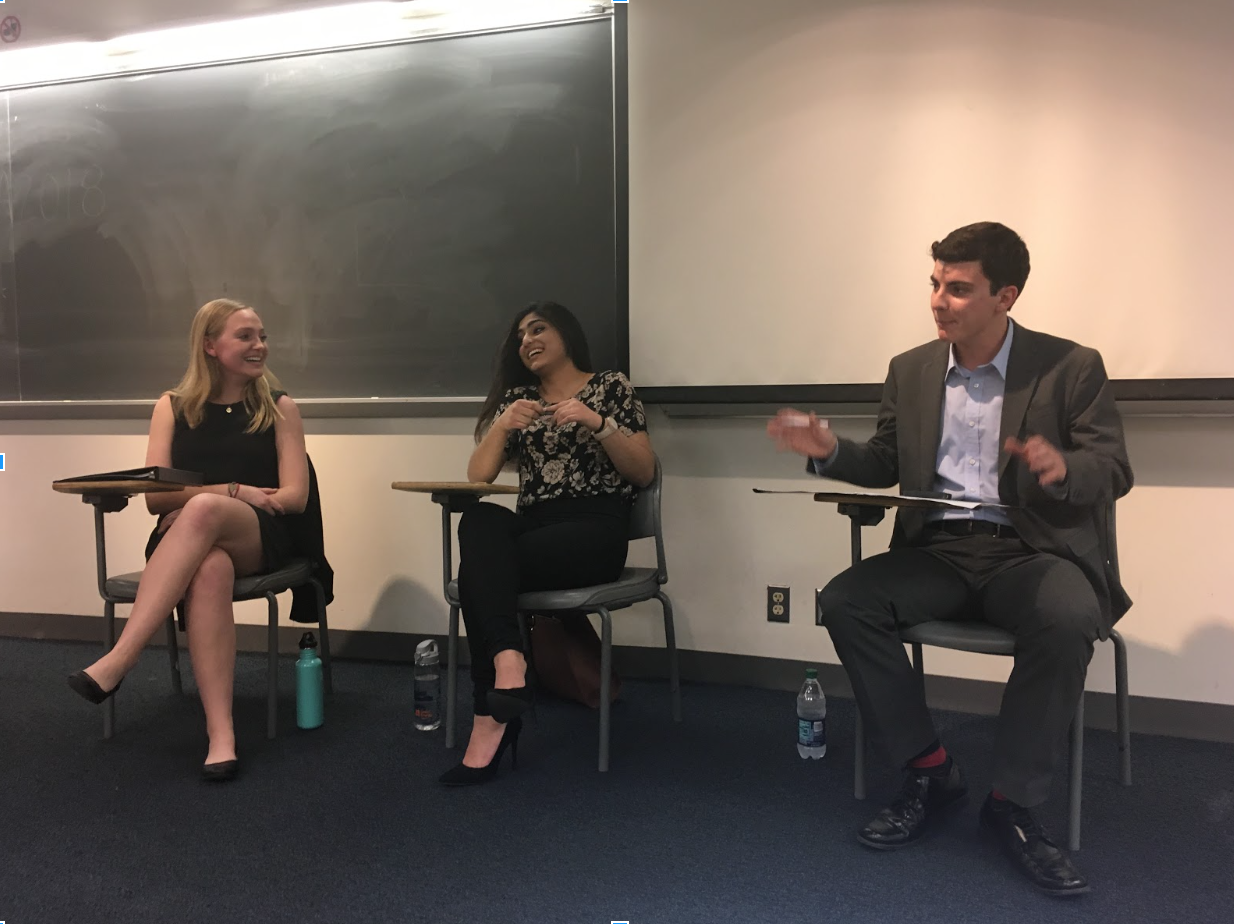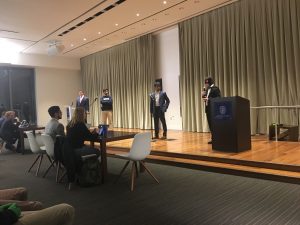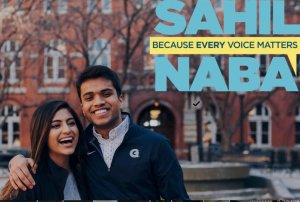GUSA vice presidential candidates shared their plans at a debate held by the GUSA Election Commission in the ICC on Feb. 14. Casey Doherty (COL ’20), Naba Rahman (SFS ’19), and Richard Howell (SFS ’19) contributed their ideas for the coming year and the programs they would like to see implemented.
Candidate Jonathan Compo (COL ’20), stylizing himself as Robin, was not present for the debate. His running mate, Logan “Batman” Arkema (COL ’20) who attended the debate, said Robin was unable to participate due to a meeting of the “Teen Titans.”
Each candidate gave a four minute opening statement, which was followed by a series of questions from campus media, including The Hoya, The Georgetown Review, the Georgetown Heckler, and the Voice.
Rahman, who is running with Sahil Nair (SFS ‘19), said in her opening speech that empowerment has been a constant thread throughout her time at Georgetown. She said that in the past, she was sometimes ashamed of her heritage and felt on the outskirts of her community.
“I now stand in front of you very proudly and loudly saying I am Pakistani, I am Muslim, I am a woman, and I will never stop talking about that,” Rahman said.
She said she aims to include all students who might feel like she once did in GUSA, and embodies this in her campaign slogan, “Because Every Voice Matters.”
Doherty, campaigning with Josh Sirois (COL ‘20), similarly stressed a message of inclusion within GUSA, and hopes to give more students the opportunity to become involved in their government.
“I want to reach out to all corners of campus that I haven’t yet, and I’m really excited to do [that],” Doherty said. “I want to brainstorm with more of you, speak with more of you, be inspired by more of you. That’s what Georgetown is all about, and that’s what GUSA should be about.”
Doherty also mentioned her campaign’s goals for reducing sexual assault on campus, including bringing in outside organizations, and implementing registration holds for students who do not complete bystander intervention programs.
Howell said that, unlike the other tickets, by not previously being involved with GUSA, his experience with student government was more in line with most of the student body.
“The majority of people on campus don’t vote in GUSA elections, and a sizeable portions of people who do vote, vote for some questionable tickets,” Howell said, in reference to the joke campaigns students have run for GUSA positions in the past.
The role of student apathy towards GUSA was revisited as the candidates discussed the referendum to restructure the GUSA senate, which will be attached to the executive ballot and it the third attempt to pass such a referendum.
“We need to mobilize the student body, and there is only so much that us saying that can do that,” Rahman said.
She described the “Community Voices Initiative” in her platform, which involves rotating round table discussions with every student club on campus, allowing each of them to have face time with the executives.
Howell made a strong statement about the failings of efforts to mobilize student support for GUSA.
“It is embarrassing to have these referendums and have them not pass, not because people voted no but because not enough people voted,” Howell said. “A lot of people look at GUSA and see the same insular group of students doing the same things time in and time out.”
Doherty disagreed with this sentiment, noting that her running mate is an active member of GUSA.
“I don’t necessarily think its a bad thing to be a GUSA insider, I’m not, my running mate is, that’s a fact,” she said. “But I think that we know how to change things from the inside and have the perspective to see things from the outside.”
The candidates discussed issues of accessibility and mental health support on campus, fielded questions regarding their proposed budgets, and discussed free speech and other pertinent campus issues. They also took questions from Twitter, including some on calls for monetary reparations from descendants of the 272 slaves sold by Georgetown in 1838 to keep the university afloat.
Rahman said she was in favor of reparations because she said the process so far has left descendants outside of the decision making process.
“Georgetown has an atrocious history with slavery, and I think that now it is our responsibility,” Rahman said. “[Reparation] was a conversation that was done exclusively by the university without the input of the descendants.”
On the other hand, Howell did not take such a strong stance on the issue because he was unsure where the money would come from, given the size of the university’s endowment.
“I suppose I would love to say I was in favor of reparations but I don’t understand what that would look like,” Howell said. “I do appreciate what the university did to give preferential treatment and access to these students.” In terms of preferential status, he then said that he believed that it is a mistake for the university to offer preferential admissions to legacy students in the first place.
Doherty supported reparations, and was glad that the conversation was happening in the first place.
“I would definitely want to know exactly what that would look like but I think its a conversation that should at least be had, and I think students should be involved,” Doherty said.
The debate for presidential candidates will be held on Feb 19 in the Healey Family Student Center.





